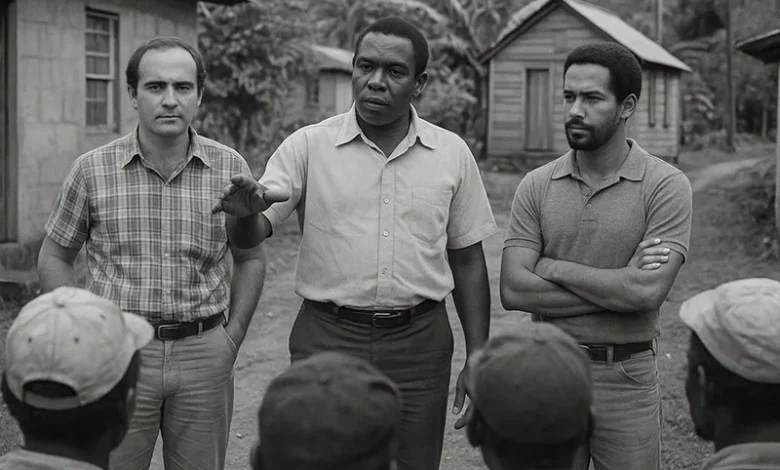Dominica Farmers Union (DFU)

The Dominica Farmers Union (DFU) was officially founded in August 1978, following grassroots organizing among rural agricultural communities. At that time, agriculture accounted for approximately 20% of Dominica’s GDP and employed over 40% of the labor force. Its structure aimed to unite smallholder producers across key sectors, such as bananas, cocoa, citrus, root crops, and livestock, into a coordinated platform representing local interests in land tenure, fair pricing, and market access.
Political Alignment and Internal Leadership Divisions
From the outset, the DFU’s leadership reflected ideological divisions. Ted Honeychurch and Alvin Armantrading represented the conservative wing of the Union, aligned with the Dominica Freedom Party (DFP). Honeychurch, a Dominican white planter and veteran of British military service, was also the father of historian Lennox Honychurch. Armantrading was a genteel planter whose wealth derived from agricultural dealings in Guadeloupe and Martinique, helping elevate his social status back home. Their alignment with the DFP reflected shared values of property rights, stability, and continuity with traditional rural elites.
Atherton “Athie” Martin: The Radical Reform Voice
By contrast, the DFU’s most passionate champion was Atherton “Athie” Martin. Educated at Cornell University with a degree in agronomy during the height of the U.S. Civil Rights and Black Power movements, Martin returned to Dominica deeply influenced by social justice ideals. He had served as an acolyte at the Roman Catholic-run Saint Mary’s Academy in his youth. Still, he channelled his convictions into labor activism while managing Castle Bruce Estate for the Commonwealth Development Corporation (CDC).
At Castle Bruce, Martin led a significant worker strike in the early 1970s, demanding better wages and access to land, and quickly became known as a proponent of land reform and farming cooperatives. His radical platform led conservative critics to label him a “communist agitator,” but he held deep support in northern and northeastern farming communities. When he joined DFU leadership, he energised the Union’s progressive faction and played a crucial role in building rural support for broader social reform.
The DFU in Dominica’s Political Transformation
The DFU’s internal leadership split mirrored the broader political currents that led to Dominica’s 1979 uprising and subsequent 1980 elections, when the DFP captured 17 of 21 parliamentary seats. Conservative figures like Honeychurch and Armantrading mobilized support for the DFP, while Martin’s influence boosted civic participation among working farmers. In constituencies like Colihaut, where Armantrading was elected MP with 78% of the vote, the DFU leadership significantly shaped electoral dynamics.
The DFU actively commented on government agrarian policies, infrastructure investment, and cooperative licensing, opposing unpopular levies or regulations deemed unfair in rural constituencies. Its influence shaped discourse around farm credit schemes, land lease reform, and hurricane resilience programs. Though never a large union by membership, its leadership held symbolic weight in policy conversations.
Decline, Legacy, and Agricultural Institutions Today
In the decades following Dominica’s political stabilisation and global banana market crises, the DFU’s prominence waned as institutional support shifted toward formal cooperatives, government agricultural agencies, and exports. The influence of leaders like Martin diminished as rural organising moved into broader civil society frameworks and statutory entities.
Yet the DFU’s legacy endures:
- It institutionalised farmer representation in national discourse before cooperatives were widespread
- It marked one of the earliest politically fragmented rural organizations in Dominican history
- It demonstrated the role of agrarian networks in political realignments before and after independence
Though no longer a dominant force, the DFU’s leadership episodes, including Martin’s reform agenda and Armantrading’s role in the conservative alliance, remain key to understanding Dominica’s transition from colonial agricultural governance to participatory rural politics.




